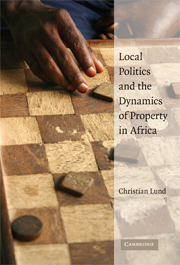Book contents
- Frontmatter
- Contents
- List of Maps, Figures, and Tables
- Acknowledgments
- Abbreviations
- Map 1 The Gold Coast, 1907
- Map 2 Regions of Ghana since 1983
- 1 Introduction
- 2 “This Situation Is Incongruous in the Extreme”: The History of Land Policies in the Upper Regions of Ghana
- 3 Who Owns Bolgatanga? The Revival of the Earthpriest and Emerging Tensions over Property
- 4 Seizing Opportunities: Chieftaincy, Land, and Local Administration
- 5 Settled Facts or Facts to Settle: Land Conflicts under Institutional Uncertainty
- 6 “Bawku Is Still Volatile”: Ethnopolitical Conflict and State Recognition
- 7 The Rent of Nonenforcement: Access to Forest Resources
- 8 Small Dams and Fluid Tenure
- 9 Conclusion
- References
- Index
2 - “This Situation Is Incongruous in the Extreme”: The History of Land Policies in the Upper Regions of Ghana
Published online by Cambridge University Press: 25 July 2009
- Frontmatter
- Contents
- List of Maps, Figures, and Tables
- Acknowledgments
- Abbreviations
- Map 1 The Gold Coast, 1907
- Map 2 Regions of Ghana since 1983
- 1 Introduction
- 2 “This Situation Is Incongruous in the Extreme”: The History of Land Policies in the Upper Regions of Ghana
- 3 Who Owns Bolgatanga? The Revival of the Earthpriest and Emerging Tensions over Property
- 4 Seizing Opportunities: Chieftaincy, Land, and Local Administration
- 5 Settled Facts or Facts to Settle: Land Conflicts under Institutional Uncertainty
- 6 “Bawku Is Still Volatile”: Ethnopolitical Conflict and State Recognition
- 7 The Rent of Nonenforcement: Access to Forest Resources
- 8 Small Dams and Fluid Tenure
- 9 Conclusion
- References
- Index
Summary
We are the makers of manners.
Shakespeare, King Henry VWhat useful discovery did Socrates learn from Xanthippe? Dialectic, Stephen answered.
James Joyce, UlyssesIntroduction: Philosophies and Dilemmas
Even when a state has only limited ambitions of direct interference in land matters, land issues can be greatly affected by its ambition to organize and reorganize the local political structure. Thus, there is often an intimate linkage between a certain polity and the land tenure regime. Martin Chanock (1991b: 64) argues that there is a profound connection between the use of the chieftaincy as an institution of the colonial government in the British colonies and the development of the customary law of land tenure. In northern Ghana, certain dilemmas animated debates and legislation about land rights during the colonial period, and it could be argued that a relatively innocuous compromise was reached over time: on the one hand, the government retained the right to appropriate all the lands it decided it needed by the Native Rights Ordinance; on the other, indirect rule seemed to allow the natural evolution of land tenure to unfold unfettered by impatient stereotypical legislation. However, recasting local political institutions and practical and managerial concerns by the colonial administrators had, in fact, a fundamental impact on land administration. This chapter looks at the period of colonial rule in northern Ghana and investigates how, at various stages, local administrators in their pragmatic efforts to deal with a number of dilemmas in effect made dramatic decisions on the land tenure system.
- Type
- Chapter
- Information
- Local Politics and the Dynamics of Property in Africa , pp. 25 - 46Publisher: Cambridge University PressPrint publication year: 2008
- 1
- Cited by



